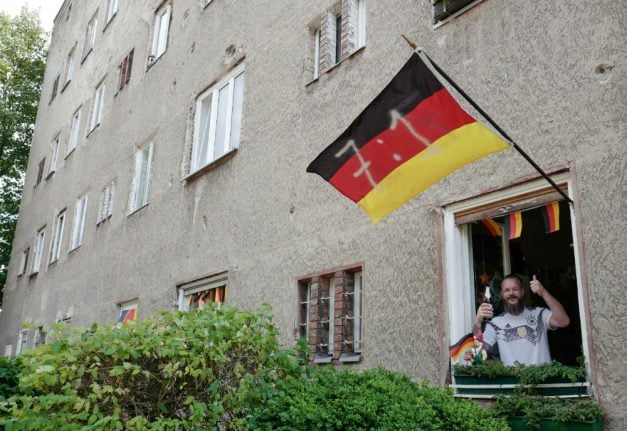Expectations are high for the reigning champions who managed to beat Argentina in the 2014 World Cup final.
But even before the shock loss to Mexico last weekend, they didn’t exactly show top form during pre-tournament friendlies, losing for instance 1-2 to Austria.
Defending a title is psychologically difficult right from the start, psychologist and head of the Rheingold market research institute Stephan Grünewald told the German Press Agency (DPA), adding that it's hard to achieve something which has been achieved once before.
“This hunger and lust for success just no longer seems to be a given with the players,” said Grünewald.
Sports reporter at Berliner Rundfunk Ralph Guhlke agrees, telling KCRW radio station in an interview that die Mannschaft didn’t play against Mexico the same way they did four years ago as world champions.
“Maybe it’s a mix of being self-satisfied… and maybe being a bit arrogant. Clearly they underestimated Mexico… and thought to themselves nothing could go wrong,” Guhlke said.
Still, the champions knew it wouldn’t be easy going into the tournament. Even though many of the 2014 stars are playing this year, key figures aren’t present, such as then-team captain Philipp Lahm, top scorer Miroslave Klose and midfielder Bastian Schweinsteiger.
On the flipside though the 2018 Mannschaft has a slew of younger talents to replace the veteran stars, such as Timo Werner, dubbed “Turbo Timo” by German media.
So what could possibly account for the team’s lacklustre performance thus far?
Politics and football
“The country is not exactly in an optimistic mood at the moment,” Grünewald said. According to the psychologist, the current political situation in Berlin has been directly impacting not only the national team, but also the sensitivities of the fans.
Chancellor Angela Merkel is currently entangled in a bitter dispute with her Interior Minister Horst Seehofer (CSU) over the issue of asylum seekers at borders. The fight threatens to collapse the German government less than three months after it was formed.
But insiders said a collapse of the coalition remained unlikely. Moreover, a survey carried out by YouGov and published on Friday showed that most Germans don’t believe the coalition will fall apart over the current political dispute between Merkel and the CSU.
Guhlke agrees with Grünewald when it comes to Deutschland being in a comparatively pessimistic mood this time around. He said that even before the team’s loss to Mexico, he felt the atmosphere wasn't exactly party-like.
 German fans at Brandenburg Gate in Berlin during the World Cup in 2014. Photo: DPA
German fans at Brandenburg Gate in Berlin during the World Cup in 2014. Photo: DPA
History, nationalism and football
“All of Berlin was covered with German flags [during the 2014 World Cup], and you don’t see many of them this time around,” Guhlke said. While proud of their modern country, it seems like Germans still have complex and mixed feelings about patriotism.
For many of die Deutschen, patriotism for Germany only properly started to become acceptable in 2006, when the country hosted the World Cup in what became known as the “summer fairytale.”
Back then, much like four years ago, the black-red-gold flag was being waved on everything from bikinis to cars. “It was in 2014 that the Germans realized they can be passionate without scaring the rest of the world,” Grünewald said.
Compared to European neighbours like France or England, historically, Germany was late in developing a strong national identity. Since 1945, the legacy of the Nazi period has weighed heavily on German culture and society.
“History has made it difficult for Germans to be patriotic,” Christian Lammert at the JFK Institute of the Free University Berlin told Handelsblatt Global, adding that things like aggression and the Holocaust have polluted national identity in the Bundesrepublik.
Looking forward (and backward)?
While 2006 showed in a way that worries about national identity were easing up, some experts the DPA interviewed say the situation has become difficult yet again, due in part to the national flag being associated with a resurgent far-right and dark times in the past.
Some members of the football community are questioning what waving the flag actually demonstrates and are much more careful or even turning away from it, said Grünewald.
But two political scientists disagree. Jürgen Falter told DPA the German flag “is not the Third Reich war flag.” Stefan Marschall chimed in by telling the news agency that anyone who flies the country's flag at football games prevents it from being “appropriated and exploited for other ideas.”
For now, if a noticeable increase in black-red-gold flags during the 2018 tournament is to take place amid a heightened optimistic atmosphere for the national team and among fans, it can only really be if die Mannschaft wins and progresses.
The grim reality for the reigning champions is this: an early exit from the World Cup could be on the cards unless they get the better of Sweden in their second match this weekend.
With DPA




 Please whitelist us to continue reading.
Please whitelist us to continue reading.
Member comments